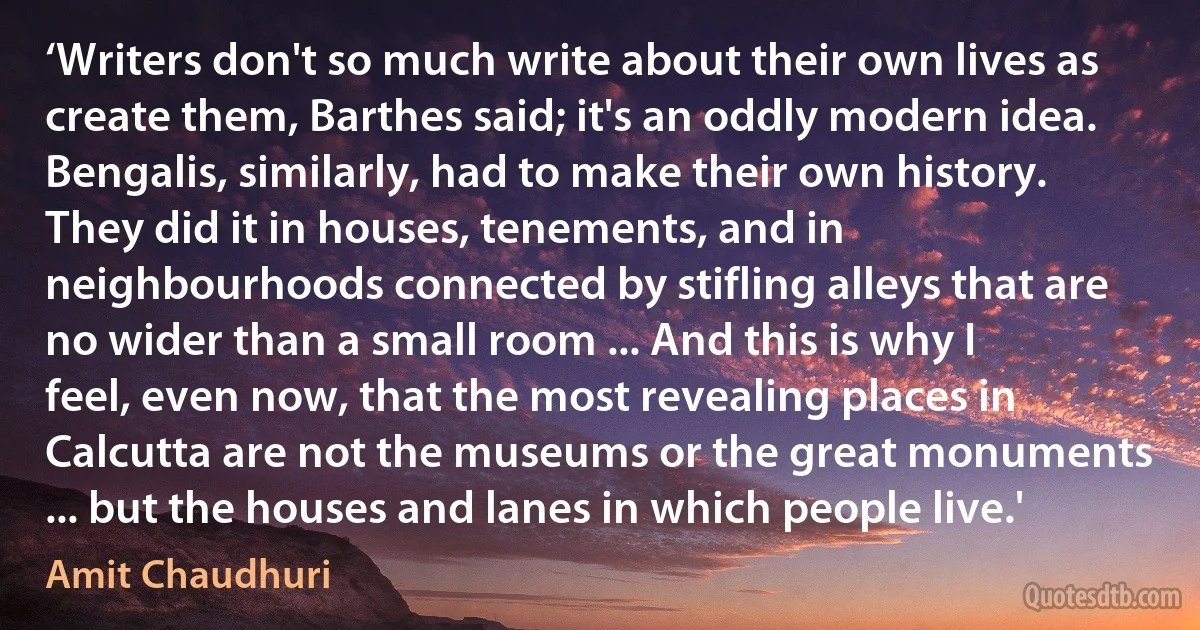Amit Chaudhuri quotes - page 4
‘... the world's cheapest small car, Tata's Nano, worth only $1500. This toy-like ill-fated vehicle, whose destiny it was to look as if it had been prematurely brought into the world, more foetus than car, and whose birth was near abortive and then indefinitely delayed, this car, when it finally took to the road, turned out to have an engine that at times exploded mysteriously. Until 2009, it was seen to be Bengal's quirky but irreplaceable mascot for development.'

Amit Chaudhuri
‘By the second half of the nineteenth century, the importance of light and space as both metaphors or, and habitations for, the human self, or "the substance called the mind”, is absolute, especially with Tagore, who, in a letter in 1894 to his niece, would demand, not political freedom ... but "more light, more space”.'

Amit Chaudhuri
‘This second time round, she'd discovered that to be happy was not so much a self-sufficient, spontaneous emotion, such as you might feel in relation to a dream or a secret, but a way of reacting to the rest of the world; that to be happy this time, she must curb the natural human instinct to look up at the sky, with its all-encompassing definition, and gaze towards the immediate ground and horizon, with its lack of shape, or abode, or clear ending.'

Amit Chaudhuri
When afternoon came to Vidyasagar Road, wet clothes ... hung from a clothesline which stretched from one side to another on the veranda of the first floor. The line, which had not been tightly drawn anyway, sagged with the pressure of the heavy wet clothes that dripped, from sleeves and trouser-ends, a curious grey water on to the floor, and, especially in the middle, one noticed the line curved downwards, as if a smile were forming.

Amit Chaudhuri
‘... this refined language of Indian modernity – an Indian language that was actually first used as a first language by a home-grown cosmopolitan elite – enough to say, with or without humour, ‘Ami tomake bhalobashi' (‘I love you') or ‘Apni kothai thhaken?' (‘Where do you live?). These stray statements performed an incantatory ‘open sesame' – into the bounded, charmed, small-scale world of ‘Bengaliness'. The ‘honorary' Bengali might be myopic; might be an aficionado of art-house cinema; might be politically left wing; might have taste for lyric poetry; a tendency towards the autobiographical; an appetite for fish; or display none of these traits.' [citation needed].

Amit Chaudhuri
‘Calcutta, for me, was a particular idea of the modern city, and I found it in many forms, works, and genres. ... by ‘modernity' I have in mind something that was never new. True modernity was born with the aura of inherited decay and life. ... if you look at paintings and photographs, and see old films of the city, you notice that these walls and buildings were never new – that Calcutta was born to look more or less as I saw it as a child. I'm not referring here to an air of timelessness; the patina that gave to Calcutta's alleys, doorways, and houses their continuity and disposition is very different from the eternity that defines mausoleums and monuments. It's this quality I'm trying to get at when I speak of modernity. ... modernity in the nineteenth century is indistinguishable from nature; perhaps it is nature – in some ways, the culvert, which has emerged from the rock, seems more of its place than the mountain itself.' [citation needed].

Amit Chaudhuri


